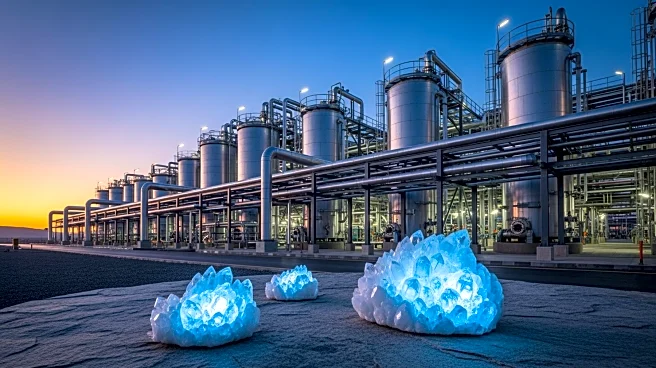What's Happening?
The United States is actively seeking to establish rare earth supply chains independent of China, which currently holds a near monopoly over these critical minerals. Rare earths are essential for various technologies, including batteries, electronics,
and defense systems. Recently, China agreed to reopen its rare earth market to US buyers after a trade dispute, providing a temporary reprieve. However, the US is mobilizing resources to develop alternative supply chains, with companies like MP Materials and Lynas USA receiving significant government investment to expand domestic processing capacity. The US is also forming alliances with countries like Kazakhstan and Australia to diversify its sources.
Why It's Important?
Rare earths are vital for the US economy and national security, as they are used in advanced technologies and defense systems. China's control over the rare earth market poses a strategic risk, especially as demand for these minerals is expected to grow with the rise of electric vehicles and clean energy technologies. By reducing reliance on Chinese imports, the US aims to secure its technological and defense capabilities. This shift could benefit US companies involved in rare earth mining and processing, while potentially reducing China's leverage in global trade negotiations.
What's Next?
The US government is likely to continue investing in domestic rare earth production and forming international partnerships to secure alternative supply chains. The Department of Defense has committed to establishing a sustainable supply chain by 2027, which could lead to increased funding and support for US-based rare earth projects. Additionally, ongoing trade talks with countries like Japan, Brazil, and Saudi Arabia may further diversify the US's rare earth sources. As these efforts progress, the US may gradually reduce its dependence on Chinese rare earths, impacting global market dynamics.
Beyond the Headlines
The US's push for rare earth independence highlights broader geopolitical tensions and the strategic importance of mineral resources. This development could lead to increased competition and innovation in the rare earth industry, as countries and companies seek to develop more efficient extraction and processing technologies. Additionally, the focus on securing rare earths may drive policy changes and investments in related sectors, such as clean energy and advanced manufacturing.















